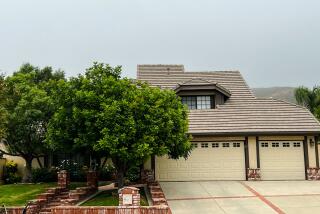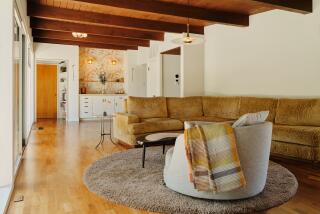When Only a One-of-a-Kind House Will Do
- Share via
The home buyer was a doctor with plenty of discretionary income yet very specific tastes in housing: He’d narrowed his search to just two streets and was hunting solely for a lot where he could build a waterfront home.
As his buyer’s agent, Leo Berard found it challenging--but not impossible--to meet the doctor’s narrow specifications. He carefully scanned local property ownership records and contacted those with vacant lots on the streets the doctor liked.
The outcome was positive. What originally sounded like a needle-in-the-haystack search proved to be realistic. The doctor was delighted to discover that Berard had found just the right lot.
There are several proven strategies for finding a highly unusual property, says Berard, charter president of the National Assn. of Exclusive Buyer Agents, based in Evergreen, Colo., whose members work solely for buyers, not for sellers.
Suppose, for instance, that you use a wheelchair and need a home that’s readily accessible--a category of property in short supply. Berard has worked with a number of such clients. And he’s been successful in finding the homes they need, with such features as access ramps, wide hallways and special kitchen counter tops.
How does Berard find atypical property? Often, he places newspaper ads or circulates brochures indicating his buyers’ needs. He also spreads word of his clients’ aspirations through calls to other agents in his community.
What astonishes agents is the great variety of preferences and needs buyers convey, said Carmel T. Grier, a broker-associate for the Realty Executives chain.
“It’s like a fingerprint; people all have their own lifestyles,” Grier said. Grier worked with a couple in their 50s seeking a small house in an exceptionally placid setting that backs to a pond. Their desire? To escape their hurly-burly lifestyle in an urban neighborhood.
Not only did Grier’s search meet the couple’s desire for a home with a pond, but she found a pond inhabited by swans. What’s more, the house featured a huge picture window overlooking the pond.
“The woman went nuts over the house when she saw it,” Grier said. “It was an adorable home with a cute floor plan, wonderful hardwood floors and a French door--a place where you could stick up a white picket fence and plant some flowers.”
Though some search for a much smaller home to unload their cares, others may dream of a much larger property with such special features as a temperature-controlled wine cellar, noted Peter G. Miller, the author of real estate books.
“What’s desirable for Smith may not be desirable for Jones and vice versa,” Miller said.
Here are five guideposts in pursuit of the atypical home:
No. 1: Recognize that some special features will cost you more than others.
“The truth is that customized homes are as varied as the people who buy them. Each situation is unique,” Miller said.
If your yen is for a home with a large outdoor pool where you can swim laps, you may not have to pay as much extra for the home as the owners spent to install the pool.
Why? Because buyers are becoming increasingly ambivalent about homes with pools, even where the climate is sunny. A pool requires extensive maintenance and also takes up valuable yard space that could be put to other uses.
Also, families with young children worry about the safety of their kids around a pool. And childless households increasingly fear a lawsuit should someone meander into the yard and be injured in the pool.
On the other hand, some special features, like a prime waterfront location or proximity to a golf course, could add significantly to the premium you’ll pay over a like house in an ordinary setting. That’s because such features are very popular.
No. 2: Make sure the special feature you’re seeking fits into the floor plan.
If you have a gaggle of children, you may be searching for a house with perhaps four, five or even six bedrooms. Still, your bank account may not allow you to consider a house in the 3,000- to 5,000-square-foot range.
In such a case, you might be tempted to buy a home and add bedrooms without expanding the core of the property. A home with a small kitchen and five bedrooms could seem odd to buyers when it’s your turn to sell.
“It could look like an army barracks,” Miller quipped.
No. 3: Surrender when the search proves so narrow as to be unrealistic.
Suppose you’re a basketball aficionado who would like nothing better than a home with a climate-controlled court built inside your compound. Because so few buyers share your quest, chances are you’ll not find what you’re looking for in the right community.
Then your second-best choice is to buy a home that readily lends itself to adding an indoor basketball court in an architecturally pleasing manner, Miller said. You’ll also want to seek out cost estimates and perhaps an architect’s opinion.
Remember, too, that indoor basketball courts appeal to only the tiniest fraction of the home-buying public, so your chances of recouping more than a fraction of your investment in such a court are remote.
No. 4: Look for care-free alternatives to charming older homes.
Are you drawn to the character and architectural detail of a house more than 50 years old? Then you could be purchasing a peck of problems, including antiquated heating, plumbing and electrical systems.
Yet the same antique ambience--without possible headaches--could be yours through a new “reproduction home,” said Berard, the owner of an independent realty chain. Builders have come to recognize that many are now nostalgic for the charm of an older home yet lack the time for fix-up work, he noted.
No. 5: Don’t expect a life transformation through that one special home.
If you’re tormented by your career or if your marriage is beginning to dissolve, you’re chasing a rainbow if you believe that a different house will make all the difference, said Grier of Realty Executives.
You can’t buy peace of mind through a material procession such as a house.
On the other hand, a special home can create a better setting for an otherwise happy household. “It’s a backdrop for whatever else people are doing with their lives,” Grier said.
Distributed by Universal Press Syndicate.
More to Read
Inside the business of entertainment
The Wide Shot brings you news, analysis and insights on everything from streaming wars to production — and what it all means for the future.
You may occasionally receive promotional content from the Los Angeles Times.










